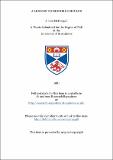A lexicon to Diodorus Siculus
Abstract
The decision to undertake the compilation of a lexicon to an ancient author needs little apology. When the author is Diodorus and the lexicon is the first, none whatsoever is needed and it is ray modest hope that the present work will prove to be a useful instrument for both students of Diodorus' work as a whole, historians and linguists concerned with a particular facet of his sources, methods, and style, and those investigating Hellenistic prose style in general. The text used as the basis for the lexicon has been that of Vogel-Fischer (Teubner, Leipzig, 1388 ff.) and all references depend on their division of the text into chapters and paragraphs. I have deliberately avoided treatment of the fragments, since it is not always clear whether the words are those of Diodorus or those of an author paraphrasing him, while one of the functions of the lexicon might be to submit the fragments to the test. The work attempts, as far as is possible, to combine the advantages of both lexicon and index: each word is analysed grammatically and semantically and each occurrence of almost every word is duly recorded. However, it has proved impossible to note all the various forms of the words used by Diodorus without allowing the lexicon to become unwieldy, when scholars seeking such information can without significant inconvenience use the references cited in the work to look up the relevant passages in order to satisfy their interest. Furthermore, I did not consider it profitable to cite every example of the definite article, some common particles, and some pronouns and demonstrative active adjectives but instead concentrated on particular usages and combinations; in this way the size of the lexicon has been reduced by some six or seven hundred pages, while the scholar investigating other uses of these words might as easily read through the entire text as check out an endless sequence of references.
Type
Thesis, PhD Doctor of Philosophy
Collections
Items in the St Andrews Research Repository are protected by copyright, with all rights reserved, unless otherwise indicated.

